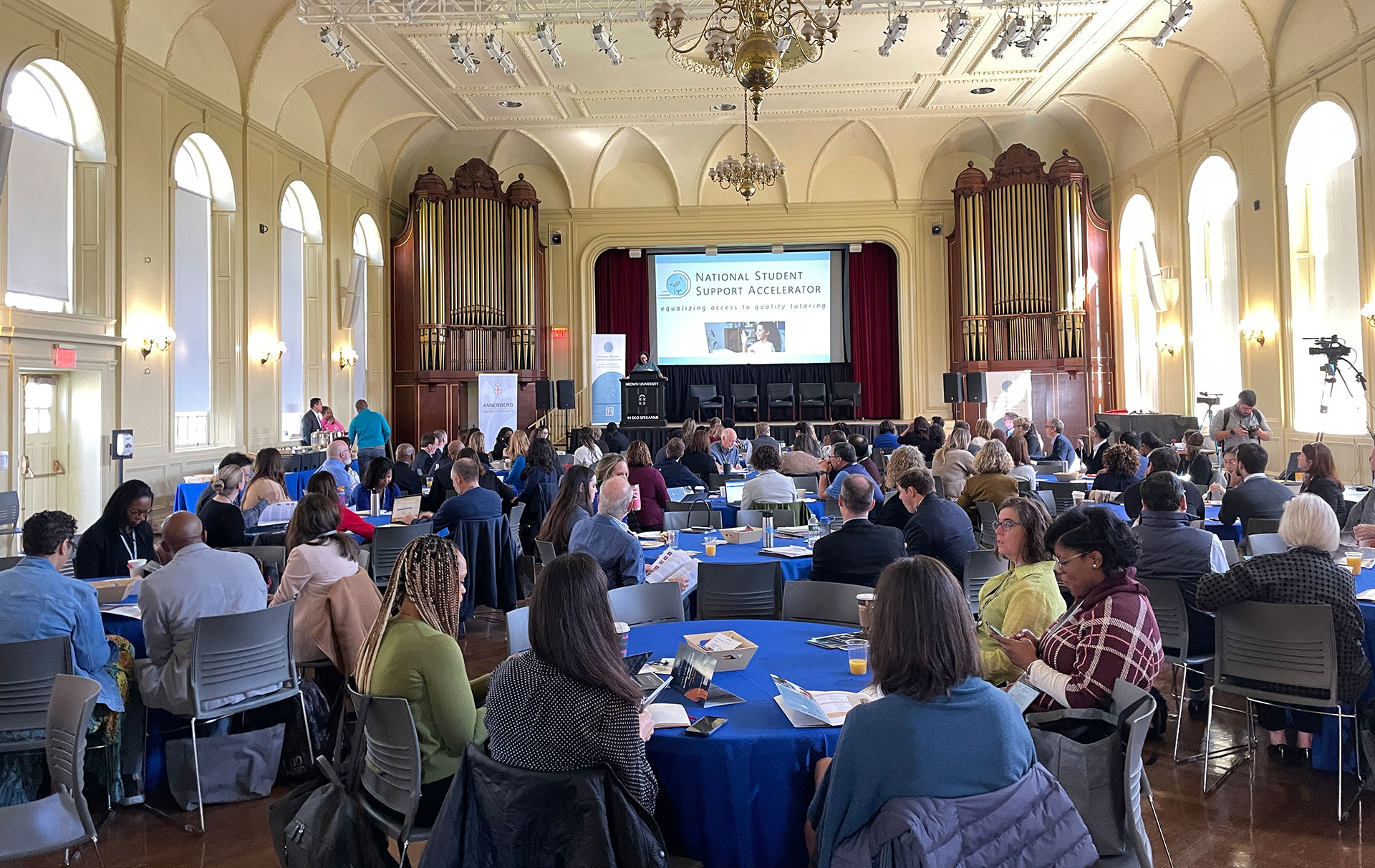Quality High-Impact Tutoring:
Research to Practice - Themes and Next Steps

On Monday, May 9, 2022, over 120 district and state leaders, researchers, educators, tutoring providers and education thought-leaders convened at Brown University to explore together what is working, what still needs to be done and how to work more effectively together to accelerate student learning, school engagement and overall well-being through high-impact tutoring, with its relationship-based individualized instruction. The conference aimed to build learning communities focused on solutions, share current research and practices, and inspire participants to grow and improve their important work for students.
Kaya Henderson, CEO of Reconstruction, kicked off the one-day meeting by inspiring us to work together in this moment of opportunity to re-envision schools to include effective, individualized learning such as high-impact tutoring for all students.
Highlights of the day included:
- Melanie Dukes from the Overdeck Family Foundation, moderated a discussion of current high-impact tutoring progress with Brittany Miller (Denver Public Schools), Phil Oreopoulos (University of Toronto), Sharla Horton-Williams (Commit Partnership) and AJ Gutierrez (Saga Education). Participants emphasized the complexity of the work and the many approaches that could lead to greater access and student opportunity. The research and early progress on implementation both indicate that the hard work is well worth the effort for students.
- Christy Borders from the Illinois Tutoring Initiative and Faith Freeman from Guilford County Public Schools shared approaches to partnering with higher education to provide effective tutors as well as expand the educator pipeline.
- Carolyn Heinrich from Vanderbilt University moderated a discussion on reducing market barriers by sharing her research on previous attempts to scale tutoring through Supplemental Educational Services and then introducing Elizabeth Moore from Gwinnett County Public Schools which used quality standards as the foundation for their district’s tutoring RFP, Sarah Glover from the Southern Education Foundation who shared an ongoing effort to use outcomes-based contracting for tutoring efforts, and Alex Cortez from Bellwether Education Partners who emphasized the need for systems change and community engagement. Table talk discussions followed in which participants reviewed current high-impact tutoring standards and provided feedback on honing and extending the standards.
- Nora Gordon from Georgetown University led the final panel focused on building sustainability, including a district perspective by Derek Little from Dallas Independent School District, a community perspective by Kenya Bradshaw from Reconstruction, a state perspective by Michael Maher from North Carolina Department of Public Instruction, and an educator perspective from Estefania Rios, a high school English teacher in Rahway New Jersey. The group recognized the challenges and opportunities for sustaining high-impact tutoring and discussed the need to deeply engage communities to improve sustainability.
- Working sessions for each of three learning communities - researchers, state and district leaders, and tutoring providers - dug deeper into problems of practice and sustainability.
Below are overall conference themes and next steps. Please also see specific highlights from each Learning Community: State and District Leaders, Researchers, and Tutoring Providers.
Conference Themes
- Participants demonstrate significant energy and interest in getting high-impact tutoring right for students. Stakeholders share a belief in the potential of high-impact tutoring to dramatically benefit students.
- A shared language and understanding of the drivers of tutoring outcomes is gaining traction.
- Many districts are beginning to actively implement high-impact tutoring
- Wide variety of models
- Some standouts: Nashville, Guilford County, Denver
- Participants are eager for connections, learning from others and additional convenings.
- Districts are facing common and significant challenges. They are open to innovative solutions. Primary challenges include:
- Scheduling tutoring into the school day
- Hiring and retaining tutors
- Partnerships with higher education institutions hold promise
- Researchers are currently working on a range of studies testing the effectiveness of different tutoring models in order to better support students and reduce cost, and they are learning about promising practices from the wave of implementation in response to the pandemic.
- Focus is moving from initial implementation to sustainability
- Integrating high-impact tutoring into the core instructional program for the long run will be key to sustainability
- Need to better incorporate community voice to ensure effectiveness and sustainability
Next Steps
The conference generated new connections, ideas and solutions that will take hold across the nation as participants return to their schools and districts. At the Accelerator, our next steps are too numerous to outline here, but at a high-level we are committed to:
- Updating the research agenda
- Considering convening smaller groups in addition to an annual conference
- Continuing to evaluate and refine industry standards
- Summarizing lessons learned, identifying and enhance existing tools, and/or building new tools to support needs of the field
A profound thank you to Melanie Dukes and the Overdeck Family Foundation for this learning opportunity to build community and improve outcomes for students.
About the National Student Support Accelerator
The National Student Support Accelerator seeks to ensure every student in need has access to an effective tutor who champions their learning and success. Launched to address student learning needs caused by COVID-19, the Accelerator does not provide any tutoring directly, but conducts, coordinates and synthesizes research and translates findings into actionable best practices. Working with states, districts, schools, and tutoring organizations, the Accelerator provides research-based best practices through tools and technical assistance to accelerate the growth of high-impact tutoring opportunities for K-12 students in need. To access tools and resources to design and implement your district’s tutoring program, better understand high-impact tutoring standards and how your tutoring program aligns, learn about state tutoring efforts, tutoring research and more, visit www.studentsupportaccelerator.org.
